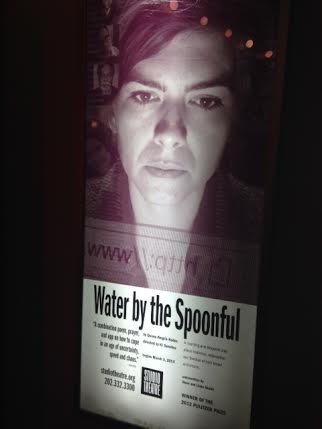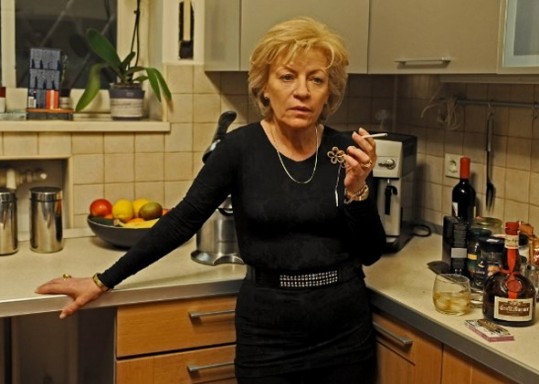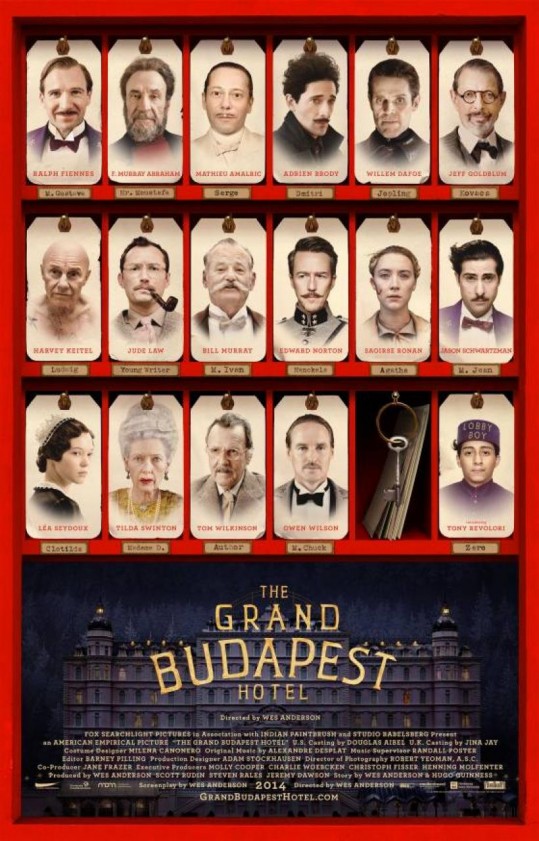Tags
"Child's Pose", "The Curious Incident of the Dog in the Night-Time", "The Grand Budapest Hotel", "Water by the Spoonful", Berlin Film Festival prizes, The Studio Theatre
One play, two films, and a heads up about a play that is coming to NY:
 Water by the Spoonful, a play by Quiara Alegria Hudes:
Water by the Spoonful, a play by Quiara Alegria Hudes:
This play, now at The Studio Theatre in Washington, DC, is the middle work of a trilogy. The first one, Elliot, A Soldier’s Fugue, was a finalist for the Pulitzer Prize in 2007. Water by the Spoonful won the Pulitzer for Drama in 2012, and the final play, The Happiest Song Plays Last opened off Broadway in February 2014 at New York’s Second Stage.
I didn’t see the first, but I do plan to see the third in NYC in the next few months.
Water by the Spoonful is two stories that merge as the play progresses. Actually, it’s more than two stories, as each of the six characters has a tale to tell (shades of Pirandello’s Six Characters in Search of an Author).
The setting is largely in Philadelphia, roughly in the present time (2009 and beyond). It concerns a returned marine (from Iraq), his cousin who is a teacher/professor, a mother, a step mother (not seen but an important presence), and three recovering addicts. The main characters are second-generation Puerto Rican Americans, who, along with three other ‘Americans,’ all struggle with personal and career issues. All six are also contending with issues of relationships and family ties.
Author Hudes manages to bring these various stories together, with humor, with music, with empathy, and with warmth. Although the subject matter is potentially a downer as the various characters struggle with their difficulties and their demons, the play never descends into hopelessness. In fact, it is quite the opposite as Hudes paints a picture of individuals figuring out their relationships and their places in the world.
The acting in The Studio Theatre’s production seemed uneven (to us). The lead actor and actress both are quite good and give strong performances. Not so much the remainder of the cast. The staging includes some of the characters’ on-line ‘chats’ about their attempts to overcome their addictions and to build relationships with other recovering addicts.

Child’s Pose**** — a film from Romania and winner of the top prize at 2013 Berlin Film Fesltival:
We saw this film in our Sunday Cinema Club, but it has now been released nationally.
It is the story of a tragedy, the death of a 14 year old boy by a 30+ year old driver (Barbu), that takes place prior to the opening of the film.
What follows is the story of how a wealthy mother/architect (Cornelia) attempts to protect her son Barbu.
The film is worth seeing simply for the performance of Luminita Gheorghliu (Cornelia), as she inserts (reinserts?) herself into her son’s life. While not an easy film to watch, it is an absorbing drama that ends with a scene you will not likely forget.
We stayed for a discussion after the film with Philip Kennicott, a Washington Post Art & Architect critic. His discussion and response to questions added immeasurably to our understanding of a subtext of the film (the cold war past in Romania and the continuing corruption there today) and a deeper understanding of the film.
If you see it, consider doing so with others and plan some time to discuss the film.

The Grand Budapest Hotel ***1/2 — another film that won a Berlin Film Festival prize, this one the Grand Jury Prize in 2014:
This is another film that was shown in our Sunday Cinema Club, tho I missed it. It is now in nationwide distribution (mostly in independent theaters?) and is drawing good crowds.
My wife had seen it and liked it and urged me to see it too. So last night I did, and I think I must have missed something as I didn’t find it charming nor ingenuous (two of the words I’ve seen describing it).
It is the fictional story of Gustave H, a famous concierge at a famous European Hotel in the fictional Republic of Zubrowka. The story takes place largely in the 1930s, following WWI and just prior to WWII, although the film opens in the 1980s and works its way back, through the 1960s to the 1930s.
Written and Directed by Wes Anderson, The Grand Budapest Hotel follows Gustave through the height of his career and into its decline (along with that of the Hotel Budapest). Much of the film is about Gustave and a young ‘lobby boy’ — Zero Moustafa — who becomes a trusted friend and mentee. It is a comedy, filled with nostalgia, and probably about something much more serious that I didn’t quite get.
I think I needed a discussion following this film to help me understand what Anderson was trying to accomplish.
But then, if that is necessary for the enjoyment of the film, perhaps it’s not a very strong film. The other possibility, of course, is that I’m a bit dull-witted myself.
** ** ** ** **
Heads Up: A play we saw and thoroughly enjoyed last year in London is coming to the US. The Curious Incident of the Dog in the Night-Time (see my mini-review, Theater at Its Best) is a production of Britain’s National Theater and will be at the Barrymore Theater in NYC with previews starting in September 2014. Based on the novel by Mark Haddon, it’s been wonderfully translated for the stage and has won numerous Oliver Awards, including one for The Best New Play. It’s worth putting on your ‘to see’ list.


Nancy Cedar Wilson said:
Rick–
regarding the ‘Budapest Hotel’–Join with other ‘dull-witted’ folks like me who didn’t see this flick’s great charm , even tho it may have been ingenuous–I thought it was quite picturesque, and wonderfully accoutred–but left me feeling sort of empty in the end–Wes Anderson IS an acquired taste, and I thought I had acquired it with his last Boy Scout Camp movie (forget the name) which was funny and sweet and thoroughly enjoyable–but this one missed the boat for me, in spite of Ralph Fiennes marvelous performance–definitely a three star movie–I was disappointed.
Tim Malieckal said:
Haven’t yet seen ‘Grand Budapest Hotel’, but my experience is that either one likes Wes Anderson, or some does not. I really liked ‘Rushmore’, but in general, he’s too twee for me.
Here’s my favorite band, the 70s fusion band Steely Dan, on Wes Anderson:
http://www.steelydan.com/heywes.html
jere said:
The “Boy Scout Camp movie” was Moonrise Kingdom–filmed in my state! I eat lunch at the beach featured in the film every week. Anyway, I saw Grand Budapest Hotel because I’ve been a fan of Wes Anderson since Bottle Rocket. I love the worlds he creates. I loved the one in GBH too, but I agree that I kind of “don’t get it.” But that didn’t stop me from enjoying it. Part of me is thinking Wes just wanted to tell a story and leave it at that. Another part of me fears I’ll have to come back and delete this comment once somebody clues me in on the deeper meaning and I’m going around bragging that I get it. Also, my theater-mate pretty much had the same reaction I did.
Richard Margolies said:
I understand you are not an r ‘n’ r / blues lover.
However, Cindy and I very much enjoyed the documentary available on Netflix, ‘Muscle Shoals’. Stunning video photography of the northern Alabama small community, the Tennessee River, swamps, fields, and sky which are the environment for what happened in that unlikely place.
In the ’60s and ’70s some of the most seminal artists came there from around the country and several foreign countries to record with the Swampers, and other backup bands who originated the Muscle Shoals sound. The Swampers were white, shocking some of the black artists when they met them. And the studios were wonderfully integrated during a time and in that place where racism was the air that people breathed.
The sound of that place is a wonderful mix of country, gospel, hillbilly, blues. The interviews and photographs and videos with these artists like the Stones, Aretha Franklin, Jimmy Cliff (from Jamaica), Bob Dylan, Wilson Pickett, Paul Simon, Etta James, etc. are wonderful to sit back and listen to.
Pass it on!
PS – For a 2:23 trailer, click on this link:
http://trailers.apple.com/trailers/magnolia/muscleshoals/